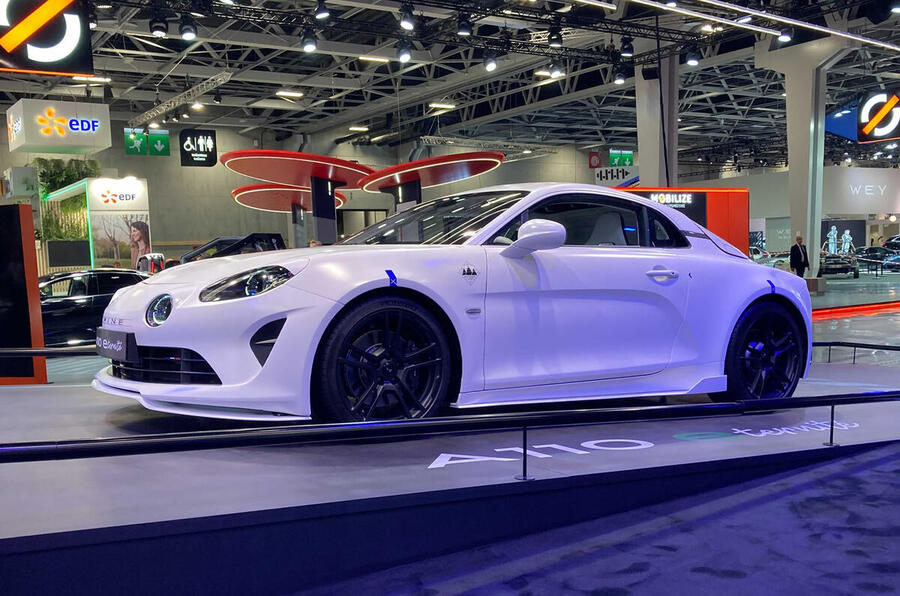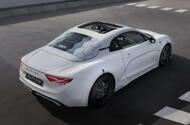Luca de Meo says investing "a lot of money" in A110 EV is "not rational" but crucial to brand's sporting credentials
The next-generation Alpine A110, due in 2026, will be lighter than combustion-engined rivals despite adopting an electric drivetrain.
Renault Group CEO Luca de Meo told Autocar that the company had made a “not rational†decision to “invest a lot of money†in a bespoke electric sports car platform for the next A110 and its derivatives – including a likely 2+2 version called the A310 – but it had “looked at Porsche for inspiration†in how to successfully build a sports brand.
“Porsche has the 911 [platform] as their own, and then they use others [VW Group architectures] for the likes of the Taycan and Cayenne. You keep the heart then as very true to the brand,†he said.
To that end, the Alpine sports car platform will be uncompromising in its purpose to root the French brand in performance models, which then lend credibility to its more lifestyle-focused mainstream models, such as the upcoming A390 SUV.
“The next A110 will be lighter than a comparable car with a combustion engine but with no compromise in performance,†said de Meo.
He added that making the bespoke architecture was objectively “a completely stupid decision†due to the likely return on investment in pure sales terms. A planned tie-up with Lotus on the architecture fell through but Alpine places such importance on bona fide sports cars that it has continued development by itself.Â
Alpine has experimented with lightweight electric models previously, such as with the A110 E-ternité concept, an electric conversion of the current A110 that just undercut the Porsche 718 Boxster at 1400kg.Â

The electric A110's design will be only subtly evolved from the current car, de Meo suggested. It "needs to look like" an A110, he said. "Porsche doesn't make a square 911."
More broadly, de Meo said “six or seven†uniquely positioned models would make up the Alpine range, including “some emotional pure sports carsâ€. Eighteen months ago, the brand said its intention was to launch seven models by 2030, starting with the new Alpine A290 hot hatchback.
The plan is to crown the range with a supercar and Alpine CEO Philippe Krief hinted that this will come towards the end of the “really ambitious†range roll-out and serve as the flagship of its “dream garageâ€.Â
Krief said the firm is “not yet†ready to launch the model, which will be developed at a new R&D centre born out of the firm’s soon-to-be-closed Formula 1 engine factory. He added that the launch of a supercar for the firm is a three-stage process: first a “brand exerciseâ€, next a “tech showcase†and then the third one is “businessâ€.
To that end, Alpine has shown off a pure concept supercar called the Alpenglow as a brand exercise in 2022, followed by a hydrogen-combustion technology showcase version of it earlier this year, the Alpenglow Hy4. The working title for the production model is Future Alpine Supercar.
Krief said Alpine wants to position itself as a “French sports specialist brand that also happens to be electricâ€, rather than call itself a pure EV maker.Â
Head of product Sovany Ang added that the firm wants to “retain accessibility†and will “target specific things and segments where it makes sense for us to beâ€, rather than try to be a volume or a premium car maker.Â
The dealer network is expanding to around 140 globally by the end of the year as Alpine looks to break itself out of France and it has established a new flagship facility in Barcelona that also includes e-sports and sim racing areas, as well as a bar and restaurant. This format will also be introduced in London and Paris.
Krief confirmed that the current A110 will end production in 2026, when a small-series exemption for GSR2 regulations ends. The next six months of A110 production are sold out and 95% of the £276,000 A110 R Ultime’s production run of 110 units sold within two months of its unveiling at the Paris motor show.




